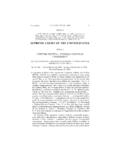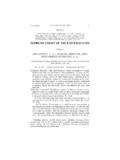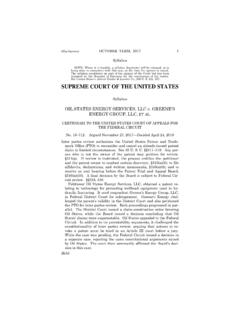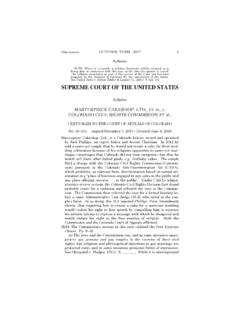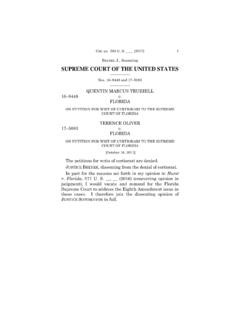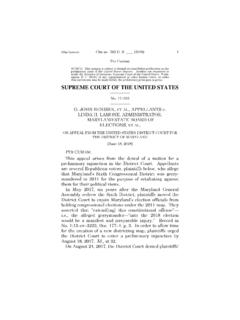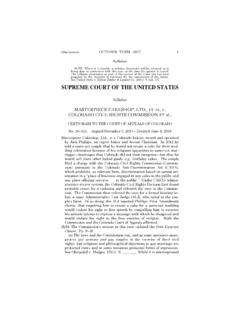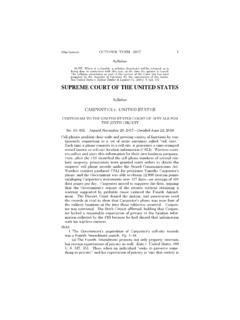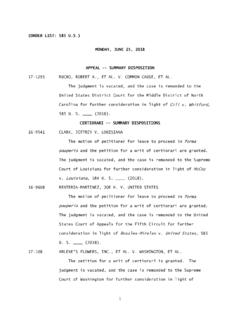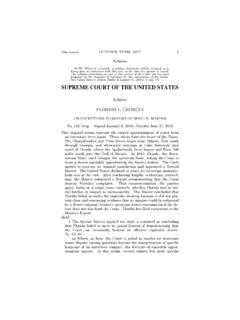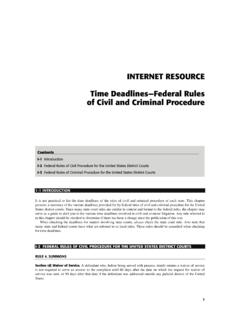Transcription of April 16, 2013 Honorable John A. Boehner
1 April 16, 2013 Honorable john A. Boehner Speaker of the House of Representatives Washington, 20515 Dear Mr. Speaker: I have the honor to submit to the Congress the amendments to the federal rules of civil Procedure that have been adopted by the Supreme Court of the United States pursuant to Section 2072 of Title 28, United States Code. Accompanying these rules are excerpts from the Report of the Committee on rules of Practice and Procedure to the Judicial Conference of the United States containing the Committee Notes submitted to the Court for its consideration pursuant to Section 331 of Title 28, United States Code. Sincerely, /s/ john G. Roberts, Jr. April 16, 2013 Honorable Joseph R. Biden, Jr. President, United States Senate Washington, 20510 Dear Mr.
2 President: I have the honor to submit to the Congress the amendments to the federal rules of civil Procedure that have been adopted by the Supreme Court of the United States pursuant to Section 2072 of Title 28, United States Code. Accompanying these rules are excerpts from the Report of the Committee on rules of Practice and Procedure to the Judicial Conference of the United States containing the Committee Notes submitted to the Court for its consideration pursuant to Section 331 of Title 28, United States Code. Sincerely, /s/ john G. Roberts, Jr. April 16, 2013 SUPREME COURT OF THE UNITED STATES ORDERED: 1. That the federal rules of civil Procedure be, and they hereby are, amended by including therein amendments to civil rules 37 and 45.
3 [See infra., pp..] 2. That the foregoing amendments to the federal rules of civil Procedure shall take effect on December 1, 2013 , and shall govern in all proceedings in civil cases thereafter commenced and, insofar as just and practicable, all proceedings then pending. 3. That THE CHIEF JUSTICE be, and hereby is, authorized to transmit to the Congress the foregoing amendments to the federal rules of civil Procedure in accordance with the provisions of Section 2072 of Title 28, United States Code. AMENDMENTS TO THE federal rules OF civil PROCEDURE Rule 37. Failure to Make Disclosures or to Cooperate in Discovery; Sanctions * * * * * (b) Failure to Comply with a Court Order. (1) Sanctions Sought in the District Where the Deposition Is Taken.
4 If the court where the discovery is taken orders a deponent to be sworn or to answer a question and the deponent fails to obey, the failure may be treated as contempt of court. If a deposition-related motion is transferred to the court where the action is pending, and that court orders a deponent to be sworn or to answer a question and the deponent fails to obey, the failure may be treated as contempt of either the court where the discovery federal rules OF civil PROCEDURE 2 is taken or the court where the action is pending. (2) Sanctions Sought in the District Where the Action Is Pending. * * * * * Rule 45. Subpoena (a) In General. (1) Form and Contents. (A) Requirements In General. Every subpoena must: (i) state the court from which it issued; (ii) state the title of the action and its civil -action number; (iii) command each person to whom it is directed to do the following at a specified time and place: attend and testify; produce designated documents, 3 federal rules OF civil PROCEDURE electronically stored information, or tangible things in that person s possession, custody, or control; or permit the inspection of premises; and (iv) set out the text of Rule 45(d) and (e).
5 (B) Command to Attend a Deposition Notice of the Recording Method. A subpoena commanding attendance at a deposition must state the method for recording the testimony. (C) Combining or Separating a Command to Produce or to Permit Inspection; Specifying the Form for Electronically Stored Information. A command to produce documents, electronically stored information, or tangible things or to permit federal rules OF civil PROCEDURE 4 the inspection of premises may be included in a subpoena commanding attendance at a deposition, hearing, or trial, or may be set out in a separate subpoena. A subpoena may specify the form or forms in which electronically stored information is to be produced.
6 (D) Command to Produce; Included Obligations. A command in a subpoena to produce documents, electronically stored information, or tangible things requires the responding person to permit inspection, copying, testing, or sampling of the materials. (2) Issuing Court. A subpoena must issue from the court where the action is pending. 5 federal rules OF civil PROCEDURE (3) Issued by Whom. The clerk must issue a subpoena, signed but otherwise in blank, to a party who requests it. That party must complete it before service. An attorney also may issue and sign a subpoena if the attorney is authorized to practice in the issuing court. (4) Notice to Other Parties Before Service. If the subpoena commands the production of documents, electronically stored information, or tangible things or the inspection of premises before trial, then before it is served on the person to whom it is directed, a notice and a copy of the subpoena must be served on each party.
7 (b) Service. (1) By Whom and How; Tendering Fees. Any person who is at least 18 years old and not a federal rules OF civil PROCEDURE 6 party may serve a subpoena. Serving a subpoena requires delivering a copy to the named person and, if the subpoena requires that person s attendance, tendering the fees for 1 day s attendance and the mileage allowed by law. Fees and mileage need not be tendered when the subpoena issues on behalf of the United States or any of its officers or agencies. (2) Service in the United States. A subpoena may be served at any place within the United States. (3) Service in a Foreign Country. 28 1783 governs issuing and serving a subpoena directed to a United States national or resident who is in a foreign country.
8 (4) Proof of Service. Proving service, when necessary, requires filing with the issuing court a 7 federal rules OF civil PROCEDURE statement showing the date and manner of service and the names of the persons served. The statement must be certified by the server. (c) Place of Compliance. (1) For a Trial, Hearing, or Deposition. A subpoena may command a person to attend a trial, hearing, or deposition only as follows: (A) within 100 miles of where the person resides, is employed, or regularly transacts business in person; or (B) within the state where the person resides, is employed, or regularly transacts business in person, if the person (i) is a party or a party s officer; or (ii) is commanded to attend a trial and would not incur substantial expense.
9 federal rules OF civil PROCEDURE 8 (2) For Other Discovery. A subpoena may command: (A) production of documents, electronically stored information, or tangible things at a place within 100 miles of where the person resides, is employed, or regularly transacts business in person; and (B) inspection of premises at the premises to be inspected. (d) Protecting a Person Subject to a Subpoena; Enforcement. (1) Avoiding Undue Burden or Expense; Sanctions. A party or attorney responsible for issuing and serving a subpoena must take reasonable steps to avoid imposing undue burden or expense on a person subject to the subpoena. 9 federal rules OF civil PROCEDURE The court for the district where compliance is required must enforce this duty and impose an appropriate sanction which may include lost earnings and reasonable attorney s fees on a party or attorney who fails to comply.
10 (2) Command to Produce Materials or Permit Inspection. (A) Appearance Not Required. A person commanded to produce documents, electronically stored information, or tangible things, or to permit the inspection of premises, need not appear in person at the place of production or inspection unless also commanded to appear for a deposition, hearing, or trial. (B) Objections. A person commanded to federal rules OF civil PROCEDURE 10 produce documents or tangible things or to permit inspection may serve on the party or attorney designated in the subpoena a written objection to inspecting, copying, testing, or sampling any or all of the materials or to inspecting the premises or to producing electronically stored information in the form or forms requested.
